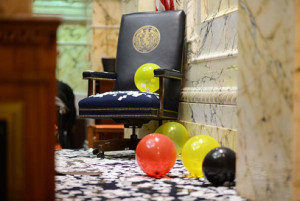 The 2015 annual 90 day session of the Maryland General Assembly ended Sine Die on April 13th. Here is an end of session update of some of the major issues. Please contact me if you would like more information on these or any other topics.
The 2015 annual 90 day session of the Maryland General Assembly ended Sine Die on April 13th. Here is an end of session update of some of the major issues. Please contact me if you would like more information on these or any other topics.
Apr 21, 2015 – Legislative Session A Success For Health Care – Rec
– Maryland State Budget. Under Governor Hogan’s leadership, the budget is the first in eight years that limits spending to the amount of revenues and is not contingent upon, nor contains, tax increases to reach a balance budget. I was proud to be a leader on the budget as the ranking member of Appropriations. It has the second-lowest rate of growth since 1968, at 1.5%, and is very different from recent budgets that ran deficits over revenue of $1 billion + per year by borrowing and stealing money from dedicated funds; however, I was disappointed that for the second year in a row, the legislature robbed promised pension funds ($75 million) to pay for additional legislative programs.
– Taxes. After 40+ tax increases under the previous administration, Gov. Hogan’s efforts to reduce taxes to put more money in the pockets of Marylanders and to make Maryland business more competitive were scaled back by the legislature. Cuts in the gas tax were eliminated, but some tax relief was provided for military retirees and small businesses, and the rain tax mandate on the counties was eliminated.
– Education. The budget contains a record $6.1+ billion in state funding for education. Hoped for reform to strengthen charter schools was defeated, though a bill did pass in their name that I thought made the law worse and I voted against it. HB 452 passed establishing a commission to review the quality and amount of standardized testing required of school children, over concerns that it was excessive and overly reduced class instruction. I supported HB 487 that would have allowed a tax credit for businesses who donate to public and private schools and several bills restricting the implementation of the Common Core Curriculum in our schools, but all were defeated.
– Environment. The governor, farmers and environmentalists reached a compromise on phosphorous management regulations that were in negotiation for many years. It was a great step forward in protecting the bay and had widespread support on all sides of the issue. The House and Senate passed a two year moratorium on hydraulic fracking that uses water under pressure to increase the production of oil and natural gas.
– Crownsville Hospital. I was pleased to sponsor HB 27 that sets up a committee of state, county and community representatives to make a final decision on the disposition of the Crownsville Hospital property. The property has languished mostly vacant for 11 years at the cost of several million dollars in upkeep and security.
– Public safety. The governor announced plans to reopen the Annapolis Barrack of the Maryland State Police and add 100 new state troopers. In addition, the governor established the Heroin and Opioid Emergency Task Force to address Maryland’s growing heroin and opioid crisis. In 2013, heroin-related overdose deaths (464) outnumbered homicides (387), which represents a 95% increase in heroin-related overdose deaths since 2010.
– Year of the Criminal. A number of bills passed this year creating a smooth path – not for victims of crime, but for those who actually perpetrated crimes against the citizens of Maryland. These bills were so numerous, that many legislators began referring to 2015 as “The Year of the Criminal”. HB 980 restores voting rights to felons upon release of prison even if still subject to parole and probation. HB 304 expands expungement opportunities for those charged with crimes. HB 121 repeals mandatory minimum sentences. SB 517 decriminalizes the possession and use of marijuana paraphernalia.
– Obamacare Exchange. The Federal Government sent a bill to Maryland for $28.4 million because the O’Malley/Brown Administration mis-allocated funds as it built the disastrous Maryland Health Exchange. A federal audit found the state misstated the number of enrollees ($15.9m) and failed to correct a material defect on the site for which the feds demanded reimbursement ($12.5).
– Animal Cruelty. HB 362 authorizes Maryland courts to order a defendant convicted of a specified charge of animal cruelty to pay the costs incurred in removing, housing, treating, or euthanizing an abused animal.












